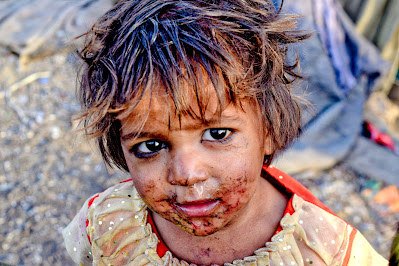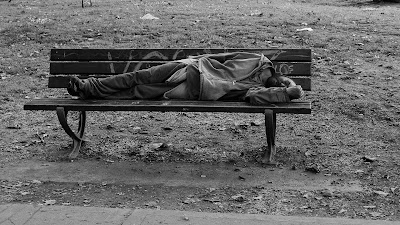The effect of poverty on patience in people
- Get link
- X
- Other Apps
Poverty is a complex and multifaceted issue that affects individuals and communities in a variety of ways. One of the most significant ways that poverty can impact people is by affecting their level of patience. Patience is the ability to delay gratification and endure difficult or unpleasant situations without becoming visibly upset or agitated. When individuals and families are struggling to meet their basic needs, they may find it more difficult to be patient and may experience a range of negative effects as a result.
The impact of poverty on daily life can be significant. People living in poverty often struggle to meet their basic needs for food, shelter, and healthcare. This can lead to a constant state of stress and uncertainty, as individuals and families may not know how they will meet their next meal or pay their bills. Additionally, poverty can limit opportunities for self-improvement, as people may not be able to afford education or job training. All of these factors can contribute to a lack of patience, as people living in poverty may feel overwhelmed and frustrated by their circumstances.
The psychological effects of poverty on patience can also be significant. When people are struggling to meet their basic needs, they may find it more difficult to delay gratification. This can lead to impulsive behavior, as people may feel compelled to take whatever they can get in order to meet their immediate needs. Additionally, poverty can lead to higher levels of anxiety and depression, which can further decrease patience. People living in poverty may also experience feelings of hopelessness and helplessness, which can make it difficult for them to see the value in waiting for something better to come along.
Poverty can also have societal effects on patience. Increased crime rates, strained relationships and social connections, and difficulty in accessing education and employment opportunities are often associated with poverty. When individuals and families are struggling to meet their basic needs, they may be more likely to resort to criminal behavior in order to get by. Additionally, poverty can make it difficult for people to maintain positive relationships and social connections, as they may be too focused on survival to be able to invest time and energy in others. Furthermore, poverty can make it difficult for people to access education and employment opportunities, which can further limit their ability to improve their circumstances.
Poverty can have a significant effect on patience in people. When individuals and families are struggling to meet their basic needs, they may find it more difficult to be patient and may experience a range of negative effects as a result. The impact of poverty on daily life, psychological effects, and societal effects can all contribute to a lack of patience in people living in poverty. It is important for society to address poverty in order to improve patience and overall well-being in individuals and communities. Addressing poverty is not only a moral obligation, but it is also an economic one. Investing in poverty alleviation programs can lead to a more productive and prosperous society in the long run.
The impact of poverty on daily life
Poverty has a significant impact on daily life, affecting individuals and communities in a variety of ways. One of the most obvious effects is a lack of access to basic necessities such as food, clean water, and shelter. This can lead to malnutrition, disease, and a lower life expectancy.
Individuals living in poverty also often have limited access to education and job opportunities, which can make it difficult for them to improve their economic situation. This can lead to a cycle of poverty that is passed down from generation to generation.
Poverty also has a significant impact on mental and physical health. Individuals living in poverty are more likely to experience stress, depression, and other mental health issues. They also have a higher risk of chronic health conditions such as diabetes and heart disease.
Poverty also affects social relationships and community cohesion. Individuals living in poverty may have fewer social connections and may experience discrimination and social exclusion. This can lead to a lack of trust and social capital within communities, making it more difficult for residents to work together to address common problems.
Poverty also has an impact on the environment. Individuals living in poverty may not have the resources to properly care for the environment and may engage in activities that are detrimental to the environment in order to survive.
Finally, poverty can also lead to a lack of political power and representation. Individuals living in poverty may not have the resources to participate in the political process and may not have a voice in the decisions that affect their lives.
Poverty has a wide-reaching and detrimental impact on daily life. It affects individuals' access to basic necessities, education and job opportunities, mental and physical health, social relationships and community cohesion, environment, and political power. Addressing poverty is crucial for improving the well-being and quality of life for individuals and communities.
Psychological effects of poverty on patience
Poverty can have a significant impact on an individual's psychological well-being, including their level of patience. Patience is defined as the ability to endure delay, trouble, or suffering without getting angry or upset. The psychological effects of poverty on patience are complex and can vary depending on the individual and their specific circumstances. However, some of the most notable effects include:
Stress and anxiety: Individuals living in poverty often experience high levels of stress and anxiety due to their financial situation. The constant worry about money and how to make ends meet can make it difficult for individuals to be patient in daily life.
Lack of control: When individuals are living in poverty, they may feel as though they have little control over their lives. This can lead to feelings of powerlessness and frustration, making it difficult for them to be patient.
Limited opportunities: Individuals living in poverty may have limited opportunities in life, which can lead to feelings of hopelessness and despair. This can make it difficult for them to be patient and motivated to improve their situation.
Social isolation: People living in poverty may experience social isolation, which can lead to feelings of loneliness and alienation. This can make it difficult for them to be patient and maintain positive relationships with others.
Chronic uncertainty: The unpredictability and chronic uncertainty that often comes with poverty can take a toll on an individual's mental and emotional health. This can lead to feelings of hopelessness, anxiety, and a lack of patience.
Negative thinking: The constant stress and uncertainty can lead to negative thinking and a pessimistic outlook, which can make it difficult for individuals to be patient in difficult situations.
Trauma: Poverty can be a traumatic experience, and individuals who have experienced trauma may have a harder time regulating their emotions, which can make it difficult for them to be patient.
While these effects can be significant, it's important to note that individuals living in poverty are not defined by their circumstances, and some people are able to maintain a high level of patience despite their financial struggles. Additionally, support from family, friends, and community resources can play a critical role in helping individuals cope with the psychological effects of poverty on patience.
Societal effects of poverty on patience
Poverty not only affects individuals on a personal level, but it also has wide-reaching societal effects, including on the patience of communities. Some of the most notable societal effects of poverty on patience include:
Economic instability: Poverty can lead to economic instability, which can make it difficult for individuals and communities to plan for the future. This can lead to a lack of patience and a sense of urgency to address financial struggles.
Limited access to resources: When individuals and communities are living in poverty, they may have limited access to resources such as healthcare, education, and job opportunities. This can make it difficult for them to be patient and improve their situation.
Social inequality: Poverty often leads to social inequality and a lack of access to opportunities for individuals and communities living in poverty. This can lead to feelings of frustration and a lack of patience in addressing these issues.
Crime and violence: Communities with high levels of poverty may experience higher levels of crime and violence. This can lead to a lack of patience and mistrust among residents, making it difficult for them to work together to address these issues.
Political disengagement: Individuals and communities living in poverty may have limited access to the political process and may not have a voice in the decisions that affect their lives. This can lead to a lack of patience and frustration with the political system.
Lack of community cohesion: Communities with high levels of poverty may have a lack of social capital, making it more difficult for residents to work together to address common problems. This can lead to a lack of patience and mistrust among residents.
Environmental degradation: Communities living in poverty may not have the resources to properly care for the environment, leading to environmental degradation. This can lead to a lack of patience and a sense of hopelessness in addressing these issues.
Public services: People living in poverty may have limited access to public services, such as transportation, healthcare, and education. This can lead to a lack of patience and frustration with the government's ability to provide for their needs.
While these effects can be significant, it's important to note that they are not inevitable, and that addressing poverty can lead to positive changes in the patience of communities. Programs and policies that focus on reducing poverty and increasing access to resources can help to improve the patience of individuals and communities. Additionally, community-based initiatives that bring people together to address common problems can also play a critical role in building trust and patience among residents.
Does poverty make people shout or raise their voices more than if they were wealthy
There is some research that suggests that poverty may be associated with increased levels of stress and frustration, which could potentially lead to an increased likelihood of raising one's voice or shouting. However, it is important to note that the relationship between poverty and shouting or raising one's voice is complex and may be influenced by a variety of factors.
One study found that poverty is associated with increased levels of stress, which can lead to a variety of negative health outcomes. Stress can be a result of financial insecurity, lack of access to basic necessities, and limited opportunities, which can contribute to feelings of hopelessness, anger and frustration. These feelings may increase the likelihood of raising one's voice or shouting as a way of expressing these emotions.
Another study found that poverty is associated with increased levels of chronic stress which can lead to a form of toxic stress. This can lead to negative behavioral, cognitive, and emotional outcomes for children which can carry over into adulthood. This type of stress can lead to impulsivity and difficulties controlling emotions, which could make it more likely for people living in poverty to shout or raise their voices.
Additionally, people living in poverty may be more likely to experience discrimination and social exclusion, which can lead to feelings of anger and frustration. These feelings may be expressed through shouting or raising one's voice.
However, it's important to note that these associations do not necessarily mean that poverty causes people to shout or raise their voices more. It's also important to consider that people from different socio-economic backgrounds may have different cultural norms and communication styles. Furthermore, some people living in poverty may have developed coping mechanisms to deal with stress and may not exhibit such behaviors.
The relationship between poverty and shouting or raising one's voice is complex and may be influenced by a variety of factors, including cultural norms and communication styles, and the coping mechanisms individuals have developed. It's important to avoid making generalizations and stereotypes about people living in poverty, and instead, understand that each individual may have different experiences and reactions to their circumstances.
- Get link
- X
- Other Apps




